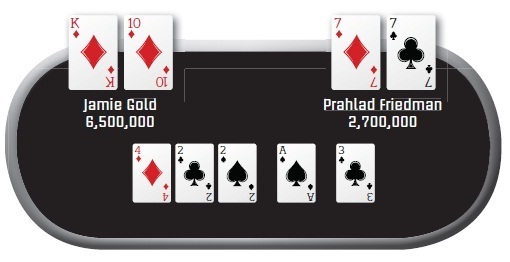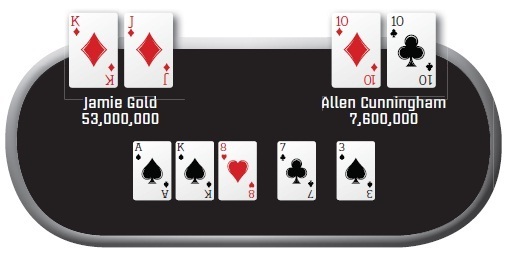






Hand History Time Capsule: Jamie Gold Talks His Way To A TitleJamie Gold's Table Talk Highlighted In This New Card Player Series |
|
|

Jamie Gold
Jamie Gold takes a lot of flack for his table talk during his run to the 2006 World Series of Poker main event title, but the former television producer was simply doing what he did best, selling himself to his opponents.
On the way to navigating through the 8,773-player field, Gold repeatedly bluffed pros and got paid off big when players finally decided to look him up. Here is a brief look at the series of hands that helped catapult Gold to poker’s biggest tournament score of all time.
Gold Talks Friedman Out of a Good Call

No other hand did a better job of demonstrating Gold’s playing style than when he faced off against Prahlad Friedman on the featured table. Gold had been cruising through the tournament, effectively talking his opponents into doing whatever he wanted. The shtick made Gold appear more like a used car salesman than a poker player, but his tactics had worked for the most part.
With the blinds at 30,000-60,000, Gold raised in early position to 175,000 holding K 10
10 and Friedman made the call with 7
and Friedman made the call with 7 7
7 . The flop fell 4
. The flop fell 4 2
2 2
2 and Gold continued with a bet of 300,000, which Friedman called.
and Gold continued with a bet of 300,000, which Friedman called.
The turn was the A , freezing Gold into a check. Rather than take control of the hand, Friedman checked behind, allowing the 3
, freezing Gold into a check. Rather than take control of the hand, Friedman checked behind, allowing the 3 to hit the river. Gold then fired out a bet of 750,000, causing his opponent to go into the tank and start fishing for information.
to hit the river. Gold then fired out a bet of 750,000, causing his opponent to go into the tank and start fishing for information.
“You got anything?” asked Friedman. “Uh huh,” said Gold. “You going to show me?” asked Friedman. “Sure,” Gold responded.
Friedman then revealed that he had done some research on Gold and proceeded to totally nail him on a hand. “I heard a story about you making a bluff,” he said. “You bet about 750,000.”
“You caught me,” said Gold. “You showed a king high that time,” Friedman continued. “You got a really good read on me,” admitted Gold. “I can’t believe you got me.”
Gold’s sudden honesty and double talk had Friedman rattled, and after a few moments he mucked his cards. Gold immediately showed the bluff, and a stunned Friedman never recovered, eventually busting in 20th place.
Gold Eliminates Biggest Threat at Final Table

Gold entered the final table with a dominating stack, holding nearly a third of the chips in play, but second place belonged to seasoned poker pro Allen Cunningham, who many felt was the favorite to take home the title.
The two traded blows throughout the final table as Gold continued to rack up casualties, eliminating the ninth, eighth, sixth and fifth place finishers. Four-handed, Michael Binger raised to 1.1 million from under the gun with K 8
8 and Gold made the call in position with the K
and Gold made the call in position with the K J
J . Cunningham saw his chance to get back into the race and squeezed all in with 10
. Cunningham saw his chance to get back into the race and squeezed all in with 10 10
10 from the big blind.
from the big blind.
Binger mucked, but Gold decided to risk the additional 6.5 million in an effort to knock out the best remaining player at the table. He was fortunate to be racing and despite having some of his outs in the muck, Gold connected on a board reading A K
K 8
8 7
7 3
3 and Cunningham silently exited in fourth place.
and Cunningham silently exited in fourth place.
Wasicka Folds Straight Flush Draw Three Handed

“This is sick,” exclaimed Paul Wasicka and indeed it was. Sitting three handed, Gold held a sizable chip lead, but an opportunity arose for him claim a double knockout when Binger and Wasicka showed some interest in a hand where he flopped an open-ended straight draw.
Gold limped on the button with 4 3
3 and Wasicka completed from the small blind holding 8
and Wasicka completed from the small blind holding 8 7
7 . Binger then made it 1.5 million to go with the A
. Binger then made it 1.5 million to go with the A 10
10 and both of his opponents made the call.
and both of his opponents made the call.
The flop came down 10 6
6 5
5 and Wasicka checked to Binger, who bet 3.5 million. Gold immediately announced that he was all in, causing Wasicka to stand up and bemoan his misfortune for being put to the test for the rest of his stack.
and Wasicka checked to Binger, who bet 3.5 million. Gold immediately announced that he was all in, causing Wasicka to stand up and bemoan his misfortune for being put to the test for the rest of his stack.
If he called and won, he’d make a sizable dent in Gold’s stack and perhaps steal just enough momentum for a comeback. If he called and lost, he’d be out in third place and out about $2 million, roughly the difference between the two spots in the payouts.
Eventually, Wasicka folded and Binger went with his top pair, top kicker. The turn was the 7 , giving Gold the winning straight and the river was the Q
, giving Gold the winning straight and the river was the Q , which would have given Wasicka a flush. Instead of being down about 2-1, Wasicka was forced to enter heads up play at an 8-1 disadvantage.
, which would have given Wasicka a flush. Instead of being down about 2-1, Wasicka was forced to enter heads up play at an 8-1 disadvantage.
A short while later, Gold talked his way into getting a call when he held top pair and Wasicka didn’t have enough chips to fold his pocket pair, giving Gold the championship and the biggest prize in poker history of $12 million.
How the Hand Histories Look Now
There’s no denying that Gold ran hot to earn his WSOP main event bracelet. En route to knocking out seven of his opponents at the final table, he managed to get a number of coolers in his favor, including flopping trips with a better kicker against Cunningham, getting paid with the nuts against Erik Friberg’s second pair and twice having pocket queens hold up against pocket jacks. To top it all off, he had 10-time WSOP bracelet winner Johnny Chan in his corner, offering advice and support.
But his victory stemmed primarily from his ability to talk opponents into calls or folds, and it didn’t matter whether he was up against first-time players or season veterans like Cunningham and Friedman.
Would Gold have continued his table talk if Friedman had correctly picked him off? Would Cunningham have stormed his way to the title had he won that key race? Could Wasicka have overcome a smaller chip deficit had he chosen to gamble with his straight-flush draw three handed? The answers to these questions are for you to decide.
